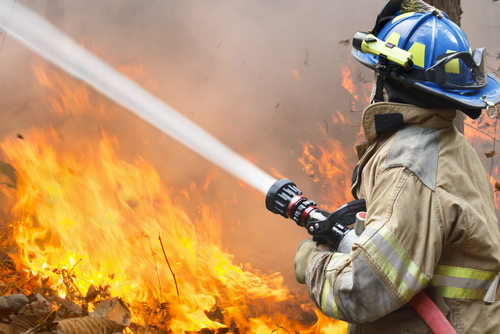
As the renewable energy landscape continues to develop, more and more homes are being equipped with solar panels as a means to reduce their carbon footprint and save on energy bills. While this development may be great for promoting a greener home, it poses some significant safety implications for firefighters should one catch on fire. Therefore, ensure your clients and their crews are protected with a custom-tailored Firefighter General Liability insurance program and share the following information with them.
The concerns.
Flat panels on roofs, poles and racks are not always electrical. They could be providing room lighting, hot air, hot water or electricity, and multiple types of panel could be combined in one installation.
Further, roof access may be limited by solar panels of any type. While some areas have local ordinances requiring setbacks and pathways, others do not or the system may have been grandfathered in. The roof areas on which you can walk or cut into for ventilation may be very limited. Putting a foot or ventilation saw into a 600 volt DC solar array during daylight hours is dangerous, says Fire Rescue 1.
Further, these systems can be hard to understand and the labels might be hard to read if they are not properly marked.
The proper safety procedures.
First, identify which type of system it is. While solar panels that provide electricity pose the biggest risk to firefighters, solar shingles and other solar equipment can be intertwined. All renewable energy systems are controlled by one central circuit, so locate the control panel to disconnect and relevant circuits if necessary. Remember, assume every electrical circuit is live, even if you have pulled the main meter and shut off visible breakers. When the sun is shining, dangerous DC voltage is still being generated in the PV panels. The only way to eliminate this is to cover all panels with an opaque tarp. Note that scene lighting is not powerful enough to generate dangerous voltage from a PV array, but lightning may be, says the article.
As a side note, remember to never cut into PV panels or step on them during roof ventilation, especially during the day. Find another place to start ventilation or change the attack strategy immediately. However, after dark, nonlethal voltage will be left in the wires leading to the panels, so this is a safer strategy.
At Provident Fire Plus, we offer custom tailored packages to best protect firefighters. We understand the risks that emergency response teams are subjected to on a daily basis, and have worked to serve these dedicated professionals for over 87 years. For more information about our products and policies, we invite you to contact our experts today at (855) 201-8880.

